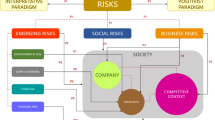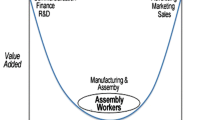Abstract
The purpose of the paper is to assess the inclusion of social sustainability in the decisions of supply chain in multinational manufacturing organisations in India. Indian organisations are resorting to sustainability-based reporting for greater transparency and for creation of brand value for their organisations. There are tremendous economic upheavals and changes across the complete value chain, and thus, responsible business practices are becoming a necessity for the long-term survival of organisations. Sustainability, as a strategy, is responsible utilisation of resources and is reported through social, economic and environmental factors in an organisation. For sustainability as a strategy, there has to be a complete organisational inclusion and employee engagement through decision making at operational levels along the value chain. The research paper is an empirical study done through a survey using a structured questionnaire to collect information to evaluate decision criteria particularly for social sustainability, from the middle and top level executives in Indian manufacturing organisations. Multinational manufacturing organisations in India are trying to be more responsible because of mandated CSR policy, and thus, sustainability through social factors is getting more prominence. A multiple linear regression analysis is used to explain the correlation and inclusion of social factors on the decision-making process in the supply chain of multinational manufacturing organisations in India. This study reveals that decision making in the supply chain of multinational manufacturing organisations in India specifically in manufacturing industry is incorporating social sustainability. The study highlights that decision making involving social sustainability needs larger frameworks for organisational preference. While the study provides evidence of social sustainability-based practices in multinational manufacturing organisations in India, it does not deal with social sustainability practices. The study also has limitation as has been limited to organisations which follow sustainability practices and make disclosures through GRI framework.
Similar content being viewed by others
References
Agnihotri, K. & Tripathi, R. (2015).Corporate sustainability: A mantra for business excellence. In Paper presented at international conference on evidence based management. BITS-Pilani: Excellent Publishing house (vol. 1, pp. 309–403).
Ahi, P., Jaber, M. Y., & Searcy, C. (2016). A comprehensive multidimensional framework for assessing the performance of sustainable supply chains. Applied Mathematical Modelling, 40, 10153–10166.
Ahi, P., & Searcy, C. (2013). A comparative literature analysis of definitions for green and Sustainable supply chain management. Journal of Cleaner Production, 52, 329–341.
Ashby, A., Leat, M., & Hudson-Smith, M. (2012). ‘Making connections: A review of supply chain management and sustainability literature. Supply chain management. An International Journal, 17(5), 497–516.
Assefa, G., & Frostell, B. (2007). Social sustainability and social acceptance in technology assessment: a case study of energy technologies. Technology in Society, 29, 63–78.
Campbell, J. L. (2007). Why would corporations behave in socially responsible ways? An institutional theory of corporate social responsibility. Academy of Management Review, 32, 946–967.
Carter, C. R., & Rogers, D. S. (2008). A framework of sustainable supply chain management: moving toward new theory. International Journal of Physical Distribution and Logistics Management, 38(5), 360–387.
Chardine-Baumann, E., & Botta-Genoulaz, V. (2014). A framework for sustainable performance assessment of supply chain management practices. Computers & Industrial Engineering, 76, 138–147. doi:10.1016/j.cie.2014.07.029.
Chauhan, A. K. (2015). Regression. Research analytics-a practical approach to data analysis. New-Delhi: Dream Tech Press.
Dauvergne, P., & Lister, J. (2012). Big brand sustainability: Governance prospects and environmental limits. Global Environmental change Elsevier, 1(3), 36–45.
Dempsey, N, Bramley, G, Power, S & Brown, C (2009).The social dimension of sustainable development: Defining urban social sustainability. Sustainable Development. DOI: 10.1002/sd.417. Retrieved 15 December, 2016 from https://www.researchgate.net/publication/229889535.
Dunphy, D., Griffiths, A., Benn, S (2006). Organisational change for corporate sustainability. Retrieved December 10, 2014, from http://www.sustenn.com/files/user_files/25_Frederic_Laloux/dunphyorganizational-change-for-corporate-sustainability.pdf.
Dyllick, T., & Hockerts, K. (2002). Beyond the business case for Corporate Sustainability. Business Strategy and the Environment, 11, 130–141. doi:10.1002/bse.323.
Global reporting Initiatives. (2002). Retrieved December 11, 2014 from https://www.globalreporting.org/reporting/G3andg3-1/guidelines-online/TechnicalProtocol/Pages/MaterialityInTheContextOfTheGRIReportingFramework.aspx.
Global Reporting Initiative. (2015). Retrieved on 15 December 2016 from <https://www.globalreporting.org/resourcelibrary/GRIG4-Part1-Reporting-Principles-and-Standard-Disclosures.pdf>.
Google form (n.d.). Online Survey form. Retrieved on October 15, 2014 from https://www.google.co.in/forms/about/.
Gopal, P.R.C., Thakkar, J. (2015). Sustainable supply chain practices: an empirical Investigation on Indian automobile industry. Production, Planning and Control. pp no.1–16
Gray. R. (2010). Is accounting for sustainability actually accounting for sustainability and how would we know? An exploration of narratives of organisations and the planet. Retrieved 21 June 2016 from http://www.sciencedirect.com/science/article/pii/S0361-3682(09)00042-7.
Gibson, R. B. (2006). ‘Sustainability assessment: Basic components of a practical approach. Impact Assessment and Project Appraisal, 24(3), 170–182.
Hedberg, C. J., & Malmborg, F. V. (2003). The global reporting initiative and corporate sustainability reporting in Swedish companies. Corporate Social Responsibility and Environment Management, 10, 153–164.
Hummel, K & Schlick, C. (2016).The relationship between sustainability performance and sustainability disclosure-Reconciling voluntary disclosure theory and legitimacy theory. Journal of Accounting Public Policy xxx (2016) xxx–xxx.(Article in Press)
Hutchins, M., & Sutherland, J. (2008). An exploration of measures of social sustainability and their application to supply chain decisions. Journal of Cleaner Production, 16, 1688–1698.
IBM. (2009). Sustainability on a Smarter Planet: Going Green and Beyond. New York: IBM.
Kaur, A., & Sharma, P. C. (2016). Global organisations and SME in India: A comparative study of sustainability initiatives. Journal of Sustainable Development, 9(3), 65–76.
Kiron, D., Kruschwitz, N., Haanaes, K., Reeves, M., Kehrbach, S. K. F., & Kell, G. (2015). Joining forces: Collaboration and leadership for sustainability. Cambridge: Massachusetts Institute of Technology.
Kiron, D., Kruschwitz, N., Rubel, H., Reeves, M., Katrin, S., & Kehrbach, F. (2013). Sustainability’s Next Frontier. Cambridge: Massachusetts Institute of Technology.
Kothari, A (2013).Development and ecological sustainability in India: Possibilities for Post-2015 framework. Oxfam India working paper series. Retrieved from 21 May 2015 from http://www.environmentportal.in/files/file/development%20and%20ecological%20sustainability%20in%20india.pdf.
Kovacs, G. (2008). Corporate environmental responsibility in the supply chain. Journal of Cleaner Production, 16(15), 1571–1578.
Labuschagne, C, Brent, A.C & Erck, R.P.G.V (2007). Assessing the sustainability performances of industries. Journal of cleaner production, Retrieved from http://repository.up.ac.za/bitstream/handle/2263/4325/Labuschagne_Assessing%282005%29.pdf?sequence=1.
Ma Ga yang (2013). Developing a Focal Firm’s Sustainable Supply Chain Framework: Drivers, Orientation, Practices and Performance Outcomes (PhD thesis, The university of Toledo, United States)
Magis, K., & Shinn, C. (2009). Emergent themes of social sustainability. In J. Dillard, V. Dujon & M.C. King (Eds.), Understanding the Social Aspect of Sustainability. New York, NY: Routledge. Retrieved on 21 June 2016 from
Majumdar, U., Rana, N., & Sanan, N. (2015). India’s top companies for CSR and sustainability. India: Futurescape-IIM Udaipur.
Mani, V., Gunasekaran, A., Papadopoulos, T., Hazen, B., & Dubey, R. (2016). Supply chain social sustainability for developing nations: Evidence from India. Resources, Conservation and Recycling, 111, 42–52.
Marsden, C. (2000). The new corporate citizenship of big business: Part of the solution to sustainability. Business and Society Review, 105(1), 9–25.
McKenzie, S (2004).Social sustainability towards some definitions. Hawke Research Institute Working Paper Series No 27. Magill, South Australia: Hawke Research Institute, University of South Australia.
Prentice, D. A., & Miller, D. T. (1992). When small effects are Impressive. Psychological Bulletin, 112(1), 160–164.
Saraswat, A. & Tewari, R. (2015). Measuring Business strategy and information system alignment for Sustainable Organizations. Paper presented at International Conference on evidence based management. BITS-Pilani: Excellent Publishing House.
Schwarz, J., Beloff, B. & Beaver, E. (2002).Use sustainability metrics to guide decision-making. Retrieved May 5, 2013, from www.cepmagazine.org.
Seuring, S., & Muller, M. (2008). From a literature review to a conceptual framework for sustainable supply chain management. Journal of Cleaner Production, 16, 1699–1710.
Sodhi, M. S. (2015). Conceptualizing social responsibility in operations via stakeholder resource-Based view. Production Operation Management, 24(9), 1375–1389.
Tata Consultancy Services 2012–2013. (2013). Corporate sustainability report-2013. Mumbai: Tata consultancy services.
Tate, W. L., Ellram, L. M., & Kirchoff, J. F. (2009). Corporate social responsibility reports: A thematic analysis related to supply chain management. Wiley Periodicals Inc. doi:10.1111/j.1745-493X.2009.03184.x.
Vallance, S., Perkins, H. C., & Dixon, J. E. (2011). What is social sustainability ? A clarification of concepts. Geoforum, 42, 342–348.
WCED. (1987). Our common future. Oxford: Oxford University Press.
Author information
Authors and Affiliations
Corresponding author
Rights and permissions
About this article
Cite this article
Kaur, A., Sharma, P.C. Social sustainability in supply chain decisions: Indian manufacturers. Environ Dev Sustain 20, 1707–1721 (2018). https://doi.org/10.1007/s10668-017-9961-5
Received:
Accepted:
Published:
Issue Date:
DOI: https://doi.org/10.1007/s10668-017-9961-5




